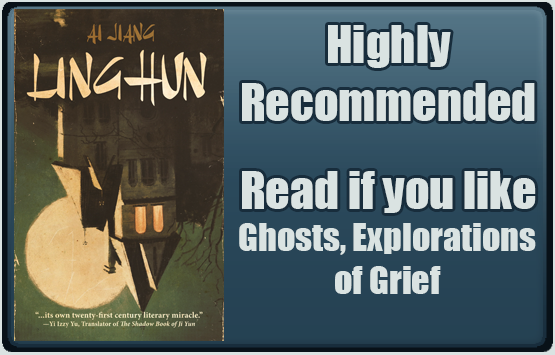Formats: Print, digital
Blurb:
| WELCOME HOME. Follow Wenqi, Liam, and Mrs. in this modern gothic ghost story by Chinese-Canadian writer and immigrant, Ai Jiang. LINGHUN is set in the mysterious town of HOME, a place where the dead live again as spirits, conjured by the grief-sick population that refuses to let go. |
Wenqi has always lived under her older brother’s shadow,
even more so since he died. She is neglected by her parents, especially her
mother, who can’t move past the tragic death of their golden child. Unfortunately,
like many countries, sexism and a preference for sons is still an issue in
China. PhD student Xueqing
Zhang, who studies gender inequality, wrote in an article for the South
China Morning Post:
As a daughter, Wenqi is valued less by her parents than her
brother was and she has to live every day knowing they wish she had died
instead of him. Her life is uprooted when her parents are able to purchase a
house in HOME in the hopes of summoning the spirit of their dead son.
Linghun is an elderly woman who lives across the street from
Wenqi’s family in HOME, and is the only resident whose house isn’t haunted. A
mail order bride from a poor farming family in China, she is sold to a Canadian
man who wants an exotic “china doll”
instead of a wife. And because Linghun’s family is unable to support her, she
has no choice but to become her late husband’s ideal woman, someone, quiet,
beautiful, and obedient. In their paper
titled The Ancient Origins of Chinese Traditional Female Gender Role : A
Historical Review from Pre-Qin Dynasty to Han Dynasty authors Cheng Chen
and Qin Bo state “for most women, even their names were not necessary. They
were called someone’s daughter when unmarried, and called someone’s wife when
married.” This clearly demonstrated by Linghun who is known only as “Mrs.” to
her neighbors, and named Linghun by her husband who dislikes her real name. Throughout
the story, she is known only by her aliases and her true name is never revealed
until the very end when she finally becomes her own person, rather than a wife
or daughter. Linghun is Mandarin for soul, or spirit, appropriate as the old
woman becomes little more than a ghost herself, haunting her house instead of
her dead husband.
Just as Linghun and Wenqi are both examples of how women and
girls can be undervalued in Chinese culture, Liam and Wenqi demonstrate what
it’s like to be a victim of neglect. Liam is what’s known as a lingerer, a
person who has chosen (or in this case his parents have chosen) to live on the
streets of HOME waiting desperately for a house to become available. Desperate
to see the baby girl that was never born, Liam’s parents gave up everything to
live as lingerers. They sit on the lawns of other people’s homes all day simply
waiting. They eat gray slop from a truck and sleep on the ground. His parents
push Liam to befriend Wenqi so they can get her house and otherwise ignore him.
In HOME, everyone is so trapped in the past that even the
school seems to be 40 years out of date. Distractions, like computers,
cellphones, and TVs are limited so residents can focus on the dead. Their lives
have completely halted over someone who’s no longer there. Life cannot be
sacred in a place where death is meaningless. The residents have more in common
with the shades that wander aimlessly in their homes than the living. And most
disturbingly of all, this is considered a highly coveted position to be in. People
will willingly become homeless just waiting for the chance at a house. It’s
like the worst parts of grief are being encouraged instead of processed in a
healthy way. Like everyone, I’ve lost loved ones whom I desperately wish I
could see again. But not enough to give up my entire life, nor would I want
anyone I care about to do that for me. The hardest part to process for me was seeing
the parents in the story neglect their living children for their dead ones. It
was both infuriating and heartbreaking. Wenqi and Liam are treated as a means
to get their dead siblings back and nothing more.
Linghun is a brilliant exploration of neglect, sexism, and the complexities of grief. Heartbreaking and disturbing, this novella is not your typical horror story, but HOME, to me, is more terrifying that any ghost. It’s not their reverence for the dead or their desire to see their loved ones again that disturbs me, in fact both those things are normal and highly relatable, but residents of HOME’s inability to move on.

No comments:
Post a Comment